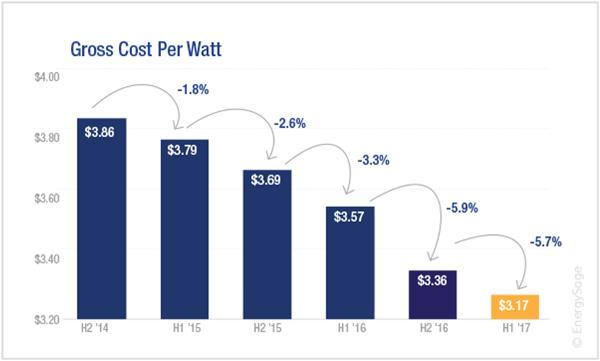It’s easy to get lost in the shadows of the coming financial crisis and to assume that the entire world is going to hell in a 140mph Tesla.
The financial crisis is real, and our money definitely is going to hell. But in the broader world, some positive things are happening. Here are two:
Solar Is Eliminating Coal
Even if you don’t believe that the stuff burning coal puts into the atmosphere is destabilizing the climate and disrupting the ocean food chain, just Google “mountaintop coal mining” for all you really need to know about that particular fossil fuel. Coal as an energy source is not that far from whale oil in terms of barbarity, and the sooner it’s consigned to history’s trashcan the better.
And that is actually happening in a big way, thanks to the emergence of solar power. The following chart of solar economics looks like something from the computer industry, which it kind of is since solar panels are similar in many ways to microprocessors. No traditional power source can compete with exponentially declining costs.

For a real world illustration of what this means:
SoftBank and Saudi Arabia are creating world’s biggest solar power generation project
(CNBC) – Saudi Arabia and Japanese telecom giant-turned-tech investor SoftBank expanded their partnership this week, announcing the world’s biggest solar power generation project at a press conference in New York.
The project was projected to cost $200 billion through 2030. That’s about how long it’s anticipated it will take to build out all 200 gigawatts of the project.
By comparison, there are roughly 70 gigawatts of solar capacity in operation, under construction or in development in the United States, according to a list of large-scale projects kept by the Solar Energy Industries Association.
The take-away: Coal, with all its attendant environmental and moral problems, is over, and oil is next. In another couple of decades the fossil fuel era will be firmly in the rearview mirror and its accumulated damage, while a long way from healing, will at least have stopped increasing.













Leave A Comment